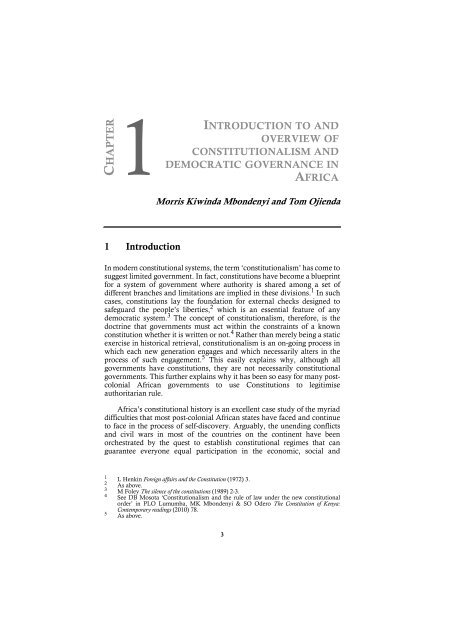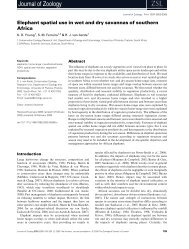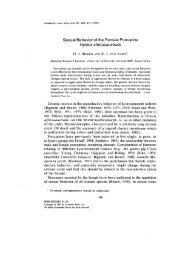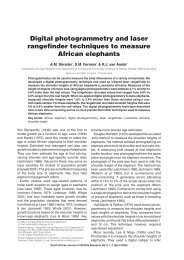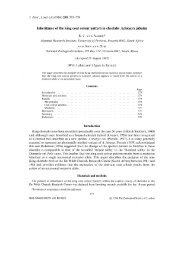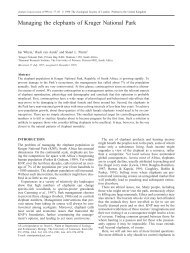- Page 1 and 2: Constitutionalism and Democratic Go
- Page 3 and 4: TABLE OF CONTENTS FOREWORD AND DEDI
- Page 5 and 6: 5 6 7 4.1 The eagerness to write ye
- Page 7 and 8: 11 12 13 3 Main features of the 199
- Page 9 and 10: FOREWORD AND DEDICATION Adieu, Stev
- Page 11 and 12: His analysis in the article deals i
- Page 13 and 14: In loving memory of our beloved dep
- Page 15 and 16: human rights law. He is also an ass
- Page 17 and 18: Constitutional Law, Human Rights, G
- Page 19: PART I: GENERAL THEORETICAL PERSPEC
- Page 23 and 24: Introduction to and overview of con
- Page 25 and 26: Introduction to and overview of con
- Page 27 and 28: Introduction to and overview of con
- Page 29 and 30: Introduction to and overview of con
- Page 31: PART II: PERSPECTIVES ON CONSTITUTI
- Page 34 and 35: 16 Chapter 2 maintains a proper con
- Page 36 and 37: 18 Chapter 2 from 26 April 1964. 11
- Page 38 and 39: 20 Chapter 2 the framers may deline
- Page 40 and 41: 22 Chapter 2 We might, in fact, thi
- Page 42 and 43: 24 Chapter 2 amendment in the conte
- Page 44 and 45: 26 Chapter 2 in the period of 1960
- Page 46 and 47: 28 Chapter 2 Republican Constitutio
- Page 48 and 49: 30 Chapter 2 1977 Constitution. 74
- Page 50 and 51: 32 Chapter 2 emergence of a party-s
- Page 52 and 53: 34 Chapter 2 consequence born as th
- Page 54 and 55: 36 Chapter 2 on the same wrongdoer
- Page 56 and 57: 38 Chapter 2 capable of being abuse
- Page 58 and 59: 40 Chapter 2 concepts engraved in t
- Page 60 and 61: 42 Chapter 2 basic question, fundam
- Page 62 and 63: 44 Chapter 2 ways of justifying the
- Page 64 and 65: 46 Chapter 2 Third, the current Con
- Page 66 and 67: 48 Chapter 2 for constitutional rev
- Page 68 and 69: 50 Chapter 2 nation to work togethe
- Page 70 and 71:
52 Chapter 3 mostly through the age
- Page 72 and 73:
54 Chapter 3 2 The making of the Fe
- Page 74 and 75:
56 Chapter 3 the people in the draf
- Page 76 and 77:
58 Chapter 3 power. It is therefore
- Page 78 and 79:
60 Chapter 3 Another major challeng
- Page 80 and 81:
62 Chapter 3 ethnicisation of polit
- Page 82 and 83:
64 Chapter 3 the party has more tha
- Page 84 and 85:
66 Chapter 3 The impact of the CSO
- Page 86 and 87:
68 Chapter 3 officials. 75 All gove
- Page 88 and 89:
70 Chapter 3 However, despite the c
- Page 90 and 91:
72 Chapter 3 only 20 per cent was r
- Page 92 and 93:
74 Chapter 3 In summary, the increa
- Page 94 and 95:
76 Chapter 3 not have the power to
- Page 96 and 97:
78 Chapter 3 Government distrust to
- Page 98 and 99:
80 Chapter 3 The fact that the poli
- Page 100 and 101:
82 Chapter 3 not subject to term li
- Page 102 and 103:
84 Chapter 3 the public as the deci
- Page 104 and 105:
86 Chapter 3 view in relation to th
- Page 107 and 108:
CHAPTER 4 CONSTITUTION-MAKING IN ER
- Page 109 and 110:
Constitution-making in Eritrea 91 n
- Page 111 and 112:
Constitution-making in Eritrea 93 a
- Page 113 and 114:
Constitution-making in Eritrea 95 d
- Page 115 and 116:
Constitution-making in Eritrea 97 I
- Page 117 and 118:
Constitution-making in Eritrea 99 d
- Page 119 and 120:
Constitution-making in Eritrea 101
- Page 121 and 122:
Constitution-making in Eritrea 103
- Page 123 and 124:
Constitution-making in Eritrea 105
- Page 125 and 126:
Constitution-making in Eritrea 107
- Page 127 and 128:
Constitution-making in Eritrea 109
- Page 129 and 130:
Constitution-making in Eritrea 111
- Page 131 and 132:
Constitution-making in Eritrea 113
- Page 133 and 134:
CHAPTER 5 CONSTITUTIONALISM AND CON
- Page 135 and 136:
Constitutionalism and constitutiona
- Page 137 and 138:
Constitutionalism and constitutiona
- Page 139 and 140:
Constitutionalism and constitutiona
- Page 141 and 142:
Constitutionalism and constitutiona
- Page 143 and 144:
Constitutionalism and constitutiona
- Page 145 and 146:
Constitutionalism and constitutiona
- Page 147 and 148:
Constitutionalism and constitutiona
- Page 149 and 150:
Constitutionalism and constitutiona
- Page 151 and 152:
Constitutionalism and constitutiona
- Page 153 and 154:
CHAPTER 6 THE DAWN OF CONSTITUTIONA
- Page 155 and 156:
The dawn of constitutionalism in Ni
- Page 157 and 158:
The dawn of constitutionalism in Ni
- Page 159 and 160:
The dawn of constitutionalism in Ni
- Page 161 and 162:
The dawn of constitutionalism in Ni
- Page 163 and 164:
The dawn of constitutionalism in Ni
- Page 165 and 166:
The dawn of constitutionalism in Ni
- Page 167 and 168:
The dawn of constitutionalism in Ni
- Page 169 and 170:
The dawn of constitutionalism in Ni
- Page 171 and 172:
The dawn of constitutionalism in Ni
- Page 173 and 174:
The dawn of constitutionalism in Ni
- Page 175 and 176:
The dawn of constitutionalism in Ni
- Page 177 and 178:
The dawn of constitutionalism in Ni
- Page 179 and 180:
The dawn of constitutionalism in Ni
- Page 181 and 182:
CHAPTER 7 A FEDERAL CONSTITUTION DE
- Page 183 and 184:
A Federal Constitution devoid of co
- Page 185 and 186:
A Federal Constitution devoid of co
- Page 187 and 188:
A Federal Constitution devoid of co
- Page 189 and 190:
A Federal Constitution devoid of co
- Page 191 and 192:
A Federal Constitution devoid of co
- Page 193 and 194:
A Federal Constitution devoid of co
- Page 195 and 196:
A Federal Constitution devoid of co
- Page 197 and 198:
A Federal Constitution devoid of co
- Page 199 and 200:
A Federal Constitution devoid of co
- Page 201 and 202:
A Federal Constitution devoid of co
- Page 203 and 204:
A Federal Constitution devoid of co
- Page 205 and 206:
A Federal Constitution devoid of co
- Page 207:
A Federal Constitution devoid of co
- Page 210 and 211:
192 Chapter 8 popular vote. The cha
- Page 212 and 213:
194 Chapter 8 At the heart of the c
- Page 214 and 215:
196 Chapter 8 constitutional propos
- Page 216 and 217:
198 Chapter 8 Rhodes wanted Bechuan
- Page 218 and 219:
200 Chapter 8 universal adult suffr
- Page 220 and 221:
202 Chapter 8 Following the endorse
- Page 222 and 223:
204 Chapter 8 acts of the legislatu
- Page 224 and 225:
206 Chapter 8 The above and other m
- Page 226 and 227:
208 Chapter 8 It is beyond doubt th
- Page 228 and 229:
210 Chapter 8 Participation in the
- Page 230 and 231:
212 Chapter 8 Despite these glaring
- Page 232 and 233:
214 Chapter 8 leadership misled the
- Page 234 and 235:
216 Chapter 8 That the constitution
- Page 237 and 238:
CHAPTER 9 POPULAR INVOLVEMENT AND C
- Page 239 and 240:
The struggle towards constitutional
- Page 241 and 242:
The struggle towards constitutional
- Page 243 and 244:
The struggle towards constitutional
- Page 245 and 246:
The struggle towards constitutional
- Page 247 and 248:
The struggle towards constitutional
- Page 249 and 250:
The struggle towards constitutional
- Page 251 and 252:
The struggle towards constitutional
- Page 253 and 254:
The struggle towards constitutional
- Page 255 and 256:
The struggle towards constitutional
- Page 257 and 258:
The struggle towards constitutional
- Page 259 and 260:
The struggle towards constitutional
- Page 261:
PART III: PERSPECTIVES ON DEMOCRATI
- Page 264 and 265:
246 Chapter 10 The military coup of
- Page 266 and 267:
248 Chapter 10 constitutional insta
- Page 268 and 269:
250 Chapter 10 3.1 Fundamental prin
- Page 270 and 271:
252 Chapter 10 of the Constitution.
- Page 272 and 273:
254 Chapter 10 responsibility. 31 T
- Page 274 and 275:
256 Chapter 10 While the Benin cons
- Page 276 and 277:
258 Chapter 10 arrested, detained o
- Page 278 and 279:
260 Chapter 10 the finance bill was
- Page 280 and 281:
262 Chapter 10 highest institutions
- Page 282 and 283:
264 Chapter 10 is perceived as an e
- Page 284 and 285:
266 Chapter 10 how the independence
- Page 286 and 287:
268 Chapter 10 5.1.5 May the Consti
- Page 288 and 289:
270 Chapter 10 Another issue about
- Page 290 and 291:
272 Chapter 10 belied public percep
- Page 292 and 293:
274 Chapter 10 functioning of state
- Page 294 and 295:
276 Chapter 10 whole. Opposition gr
- Page 296 and 297:
278 Chapter 10 Constitution as Beni
- Page 298 and 299:
280 Chapter 10 6 Dilemmas of whethe
- Page 300 and 301:
282 Chapter 10 face an alternative
- Page 302 and 303:
284 Chapter 10 between the first ro
- Page 304 and 305:
286 Chapter 10 become ‘politicise
- Page 306 and 307:
288 Chapter 10 patronage of both th
- Page 308 and 309:
290 Chapter 10 forefront position i
- Page 310 and 311:
292 Chapter 11 irregularities acros
- Page 312 and 313:
294 Chapter 11 manipulated by narro
- Page 314 and 315:
296 Chapter 11 seriously be organis
- Page 316 and 317:
298 Chapter 11 National Youth Counc
- Page 318 and 319:
300 Chapter 11 continues to be, a m
- Page 320 and 321:
302 Chapter 11 democracy. The facto
- Page 322 and 323:
304 Chapter 11 effective electoral
- Page 324 and 325:
306 Chapter 11 argued that he did n
- Page 326 and 327:
308 Chapter 11 bureaucrats; they ho
- Page 328 and 329:
310 Chapter 11 opposition parties t
- Page 330 and 331:
312 Chapter 11 Theodore Ssekikubo,
- Page 332 and 333:
314 Chapter 11 under systems akin t
- Page 334 and 335:
316 Chapter 12 country and how thes
- Page 336 and 337:
318 Chapter 12 West; and the oil pa
- Page 338 and 339:
320 Chapter 12 Experience on the Af
- Page 340 and 341:
322 Chapter 12 the African agenda a
- Page 342 and 343:
324 Chapter 12 of the federation),
- Page 344 and 345:
326 Chapter 12 was also under the l
- Page 346 and 347:
328 Chapter 12 Ekeh expressed the g
- Page 348 and 349:
330 Chapter 12 mandate, the incarce
- Page 350 and 351:
332 Chapter 12 than the defence of
- Page 352 and 353:
334 Chapter 12 structural reform or
- Page 355 and 356:
CHAPTER 13 Ademola FROM MILITARY RU
- Page 357 and 358:
From military rule to constitutiona
- Page 359 and 360:
From military rule to constitutiona
- Page 361 and 362:
From military rule to constitutiona
- Page 363 and 364:
From military rule to constitutiona
- Page 365 and 366:
From military rule to constitutiona
- Page 367 and 368:
From military rule to constitutiona
- Page 369 and 370:
From military rule to constitutiona
- Page 371 and 372:
From military rule to constitutiona
- Page 373 and 374:
BIBLIOGRAPHY Books Abubakar, D (200
- Page 375 and 376:
Bibliography 357 Henkin,L (1972) Fo
- Page 377 and 378:
Bibliography 359 Rudin, HR (1938) G
- Page 379 and 380:
Bibliography 361 Federico, V ‘Dem
- Page 381 and 382:
Bibliography 363 Olaniyan, K ‘Civ
- Page 383 and 384:
Bibliography 365 Buergenthal, T ‘
- Page 385 and 386:
Bibliography 367 Heilbrunn, JR ‘S
- Page 387 and 388:
Bibliography 369 Oko, O ‘Consolid
- Page 389 and 390:
Bibliography 371 Wuerffel, KN ‘Di
- Page 391 and 392:
Bibliography 373 Noudjènoumè, P
- Page 393 and 394:
Bibliography 375 Mangu, AMB ‘Fede
- Page 395:
Bibliography 377 Kgosikgolo Kgafela


